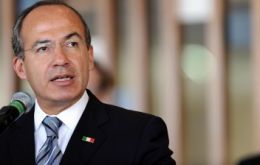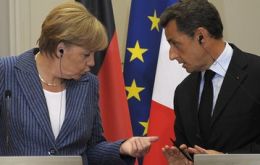MercoPress. South Atlantic News Agency
Stories for September 15th 2011
-
Thursday, September 15th 2011 - 21:43 UTC
US financial crisis is “political” and needs of strong decisions, says Rousseff

Brazilian president Dilma Rousseff said the financial crisis in the Untied States which is contaminating the rest of the world is more ‘political’ than economic and it’s not only a matter of money, but also and mainly of ‘strong decisions’
-
Thursday, September 15th 2011 - 21:28 UTC
Spanish corporations have 130 billion dollars invested in Latin America

Foreign Minister Trinidad Jimenez emphasized this week the growing relevance of Spain in Latin America, where Spanish firms have made 130 billion Euros worth of investments.
-
Thursday, September 15th 2011 - 21:13 UTC
Chavez to undergo new chemotherapy, but promises he will never shut-up

Venezuelan President Hugo Chavez said this week that he will probably have to undergo a fourth cycle of chemotherapy for cancer, but insisted that he will campaign for re-election next year “with the energy that circumstances require”.
-
Thursday, September 15th 2011 - 21:08 UTC
One out of every four US Hispanics is living in poverty, shows 2010 Census

One out of every four US Hispanics – 13.2 million people – is living in poverty, according to a report based on the US 2010 Census data that was released this week.
-
Thursday, September 15th 2011 - 21:03 UTC
Obama defends his policy towards Latin America and praises Mexico

US president Barack Obama defended his Latin American policy, praised Mexico’s resilience in the drugs war, criticized Cuban reforms as insufficient and emphasized the ‘equals-relation’ between countries in the region and Washington.
-
Thursday, September 15th 2011 - 20:52 UTC
JPMorgan lowers Latin America’s growth estimate for 2012 to 3.5%

US bank JPMorgan lowered Latin America’s growth estimate for 2012 from 3.9% to 3.5% mainly because of the impact of the slower EU and US economies, even when the Latam reduction is less than in other regions of the world.
-
Thursday, September 15th 2011 - 19:05 UTC
Uruguay’s second quarter slowdown surprised economic consultants’ estimates

Uruguay’s main economic consultants admitted they missed, and by quite a margin, their Uruguayan economy performance estimates for the second quarter which according to the Central bank only expanded 0.5%.
-
Thursday, September 15th 2011 - 19:02 UTC
IMF calls for joint political leadership to break vicious circle of weak growth

The head of the International Monetary Fund today urged advanced countries to take bold, coordinated action to break a vicious cycle of weak growth and high debt that threatens the global economy and has been worsened by dysfunctional politics.
-
Thursday, September 15th 2011 - 18:52 UTC
Lagarde to Mantega: BRIC offer should not be limited to EU safe bonds

The International Monetary Fund hopes investments in European bonds by the fast-growing BRIC (Brazil, Russia, India and China) economies are not limited to less risky government bonds such as German or British bonds, IMF managing director Christine Lagarde said in an Italian daily on Wednesday.
-
Thursday, September 15th 2011 - 18:47 UTC
US unemployment benefit applications climb for second week running

The number of Americans filing new claims for jobless benefits rose unexpectedly last week in a sign concerns about a weak economy were sapping an already beleaguered labour market, data showed Thursday.
